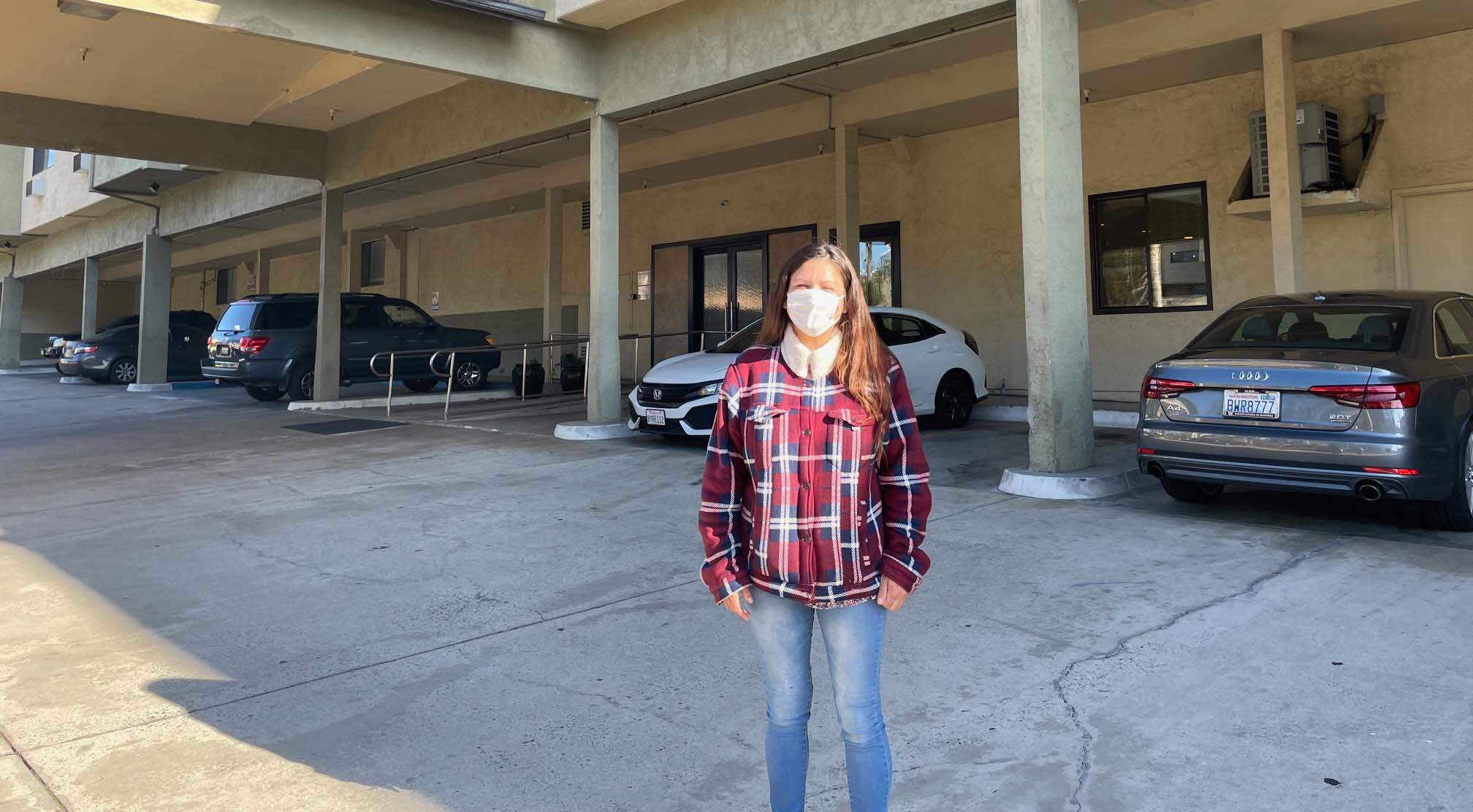SDSU's Transitional Housing for Homeless Students Continues to Expand
The Rapid Re-Housing Program adds six rooms at a La Mesa hotel for immediate needs.

“It’s a major relief. It’s taken off a lot of stress.”
San Diego State University and community partner Home Start Inc. are making six rooms available in a La Mesa hotel as transitional housing for homeless students in an expansion of the university’s Rapid Re-Housing Program.
SDSU is among seven campuses awarded funding from California State University for rapid rehousing in 2020 under an Assembly bill specifically addressing student homelessness and housing insecurity at colleges. SDSU’s proposal was allocated $870,000, which includes $650,000 for Home Start.
“Our role is to support students to be successful, and our duty is to help them fulfill their basic needs,” said Chelsea Payne, associate director of the SDSU Economic Crisis Response Team (ECRT), which leads the rehousing program. “Housing insecurity and homelessness make it difficult for our students to be successful in the classroom, so we are doing everything we can to give students options to eliminate that obstacle.”
Rapid re-housing seeks to provide temporary shelter and supportive services for homeless individuals and families as soon as possible as a transition to permanent housing.
In addition to rental assistance and a housing locator to help students find housing across the county, the SDSU Rapid Re-Housing Program also includes case managers who aim to prevent students from slipping back into homelessness. The program, which has helped a small number of students as it got started, is now fully underway and looking to reach more SDSU students with housing issues.
“The Rapid Re-Housing program is incredibly important for our students,” said Dean of Students Randy Timm. “In addition to helping us live up to our values of creating a caring and inclusive community, the program supports our student success goals. Students will be challenged to do well in classes if they can’t meet their basic needs, including having a secure place to live.”
SDSU’s new partnership with San Diego-based nonprofit Home Start Inc., which supports at-risk youth and families, will provide transitional housing for students with immediate critical housing needs.
Supported by the state’s grant money, Home Start signed an agreement with Vista International Inc., which owns the Lodge of La Mesa hotel for six of the rooms to be used for SDSU students. The hotel owners’ plan is to work with community agencies who need transitional housing for clients.
Students can stay in the hotel rooms as long as they are actively involved with the Rapid Re-Housing Program and looking for permanent housing. The program pays for both rent and utilities.
Earlier in January, students were occupying five of the six rooms, said ECRT Housing Stability Coordinator Keiara Allen. A sixth student moved into permanent housing.
One of those students is Amber Enriquez, a fourth-year public health major, who was living in a mobile home for one and a half years by Mission Bay with her 8-year-old daughter before applying for re-housing assistance.
Enriquez said her new home has provided her with safer living conditions and with basic amenities that people often take for granted.
“Having to park and move multiple times a day and having to dump and fill your water, having to turn the generator on to charge your phone or to have electricity is very difficult and expensive,” Enriquez said of mobile-home living. “And now, to be able to turn on a light switch or charge my phone without having to worry about running out of gas, it’s a major relief. It’s taken off a lot of stress.”
Relieving pressure
Allen, an SDSU alumna who serves as the main point of contact on housing insecurity for students, said not having a reliable roof over their heads is one of the most all-encompassing pressures that students can face.
“Being a student and struggling with homelessness or housing insecurity is unique in that students are often impacted mentally and academically by the effects of their living situation,” she said. “Unlike the general population, students in these situations are up against more factors as they struggle to reach their educational goals.”
Students receiving rehousing assistance gain something that goes a long way in a college career.
“Students have stability, often for the first time in their lives since living with their families,” Allen said. “This, along with increased well-being and educational attainment.”
D’Shea Wade, a junior Africana Studies major, can attest to this. After struggling with housing insecurity during four semesters of community college, he was accepted to SDSU while facing eviction from his apartment.
Assistance from the Rapid Re-Housing Program proved vital.
“It took away the stress of having to come up with a certain amount of money each month and allowed me to focus on school,” Wade said. “The school part is hard enough without having to worry about where you’re going to live. But now, I have it figured out, and in the last three semesters you can see the difference in my grades.”
Allen said that stories like Wade’s are why she believes in rapid re-housing.
“The most rewarding thing so far has been working with students who have never told their story to anyone — those who have been struggling in silence and have found a program that is here to help them through these complex situations,” Allen said. “My passion is this work, and being able to do what I love every day is in itself rewarding to me. I'm also looking forward to attending some future student graduations.”
To request assistance from the Rapid Re-Housing Program visit the SDSU Economic Crisis Response Team website or email Keiara Allen at [email protected]
ECRT offers additional resources, both on and off campus, to help SDSU students through immediate food, housing or financial crises.



